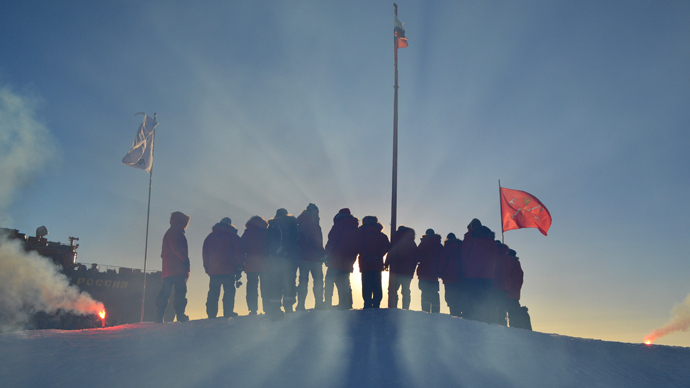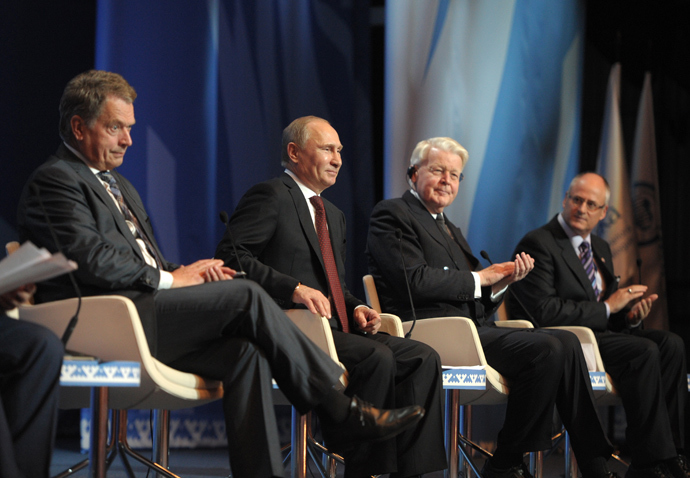Arctic quest: The Great Game points north

Energy and trade have long dominated great power politics. The new “hot” region for development is in fact one of the coldest: In the Arctic, power means all manner of energy as well as influence in key developing trade routes.
Far away from highly publicized supranational trade blocs such as the Association of Southeast Asian Nations, the European Union and the North American Free Trade Agreement, a fascinating gathering is taking place a long way up north. In the Arctic, in fact: a place inhabited by a sparse 4 million people from some 30 ethnic groups, governed by eight nations – albeit with Canada and Russia the major powers, controlling some 80 percent of the governed landmass. The region covers 30 million square kilometers (18 million square miles), or one-sixth of the Earth, and includes all 24 time zones.
The third Arctic Forum is currently taking place with President Vladimir Putin the most high-profile attendee, discussing key topics relating to both the sustainability and development of the region. Nevertheless, the conference venue may not be a place on everybody’s lips: Russia’s Salekhard, the closest city to the Arctic Circle, is thriving with a population of 42,000 thanks to its being a highly significant economic center sitting slap bang in the middle of massive Arctic oil and gas reserves, which across the region account for some 10 percent of known world hydrocarbon reserves.
Many already discovered Arctic reserves have yet to be exploited and there is considerable belief that the region has vastly more hydrocarbons lying under the Polar ice – perhaps one-fifth or more of total world reserves. Melting ice is promoting more exploration, which is driving a tense poker game of land grabs as nations try to assert their claims over previously unattractive sheets of ice.

At the same time, the reduction of the ice means greater
potential to travel and a huge opportunity for new shipping
routes. That is provoking a fascinating outbreak of great power
politics between the US, Canada, Russia and others (including
China). The quest for Arctic dominance even includes a new arms
race in the region: Russia, for instance, recently announced the
restoration of the substantial Soviet-era military base on the
Novosibirsk Islands, as competition over regional dominance and
concerns for defense increase. At the same time, the proximity of
the Novosibirsk Islands to the northern sea route could prove
pivotal if the increased thaw enables greater merchant naval
traffic – a short cut compared to southern routes. Previously,
Canada has also actively developed new ports and military
facilities, such as a training base in Resolute Bay. Elsewhere,
China has a certain proxy influence through Iceland, so all the
major powers are represented in this final dash for hegemony in a
region largely ignored until recent times.
The US government may have recently approved an aggressive
“Arctic Action Plan” having already somewhat trampled on the feet
of even its own allies in the region as the race for regional
dominance accelerates. Exploring and laying claim to the
Lomonosov Ridge has been undertaken by several nations including
Norway as well as the regional superpowers, while stories abound
of US submarines exploring trade routes beneath the ice.
Meanwhile, the Chukchi plateau is a key piece of sea floor
contiguous to Alaska claimed by the USA. Above the surface the US
Canada and Russia have been assiduously demonstrating their
innovative new fleets of ‘icebreakers’ as part of the process of
asserting their claims on territory they believe is rightfully
theirs.
Aside from increasingly accessible hydrocarbons, there is a massive opportunity for sustainable energy to be developed using geothermal and hydropower. That has already revolutionized the energy situation in Iceland, for instance. Nowadays, large multinational companies such as BMW have relocated their data centers to enable them to exploit Iceland’s incredibly cheap electricity. Russia and Iceland appear to be developing their cooperation to deploy more geothermal energy in the Arctic, which again has a particularly transformative possibility for both economies and could deliver very cheap power at a time when many European countries such as Britain and Germany will soon face enormous energy shortages, due to their myopic energy policies.
Nevertheless, the geopolitical background to the Arctic remains complex as, under international law, nobody controls the North Pole and the surrounding area. The UN Convention on the Law of the Seas endeavors to codify land claims, but this is difficult – given that the US has not yet ratified the treaty. Therefore, various portions of the Arctic sea region are in dispute, including the rights to the Northwestern Passage and northern sea route. Several nations have been “flag posturing” throughout the past 20 years or more, as they jostle for competition to secure what they perceive as their sovereign territory.
Whether the ice continues to melt or not, technological advances
mean that the Arctic may be forever changed as its various
resources are exploited for geothermal, hydro and of course oil
and gas. The desire to transit through the region will cause many
standoffs. However, the ability to derive low-cost energy from
the region could provide a significant driver for economic growth
– provided the great powers do not descend into conflict driven
by the quest for dominance. In a region that will become much
more significant as the Arctic Forum continues to meet, even
tourism is increasingly on the agenda as intrepid travelers go
ever farther north to experience exotic destinations.
The region hangs under the shadow of potential aggression as
several parties may up the ante to impress their claims on
territory they believe contiguous to their ocean shelves, both
Canada and Russia will doubtless be amongst those keen to rebut
upstart territorial claims.
The statements, views and opinions expressed in this column are solely those of the author and do not necessarily represent those of RT.
The statements, views and opinions expressed in this column are solely those of the author and do not necessarily represent those of RT.













